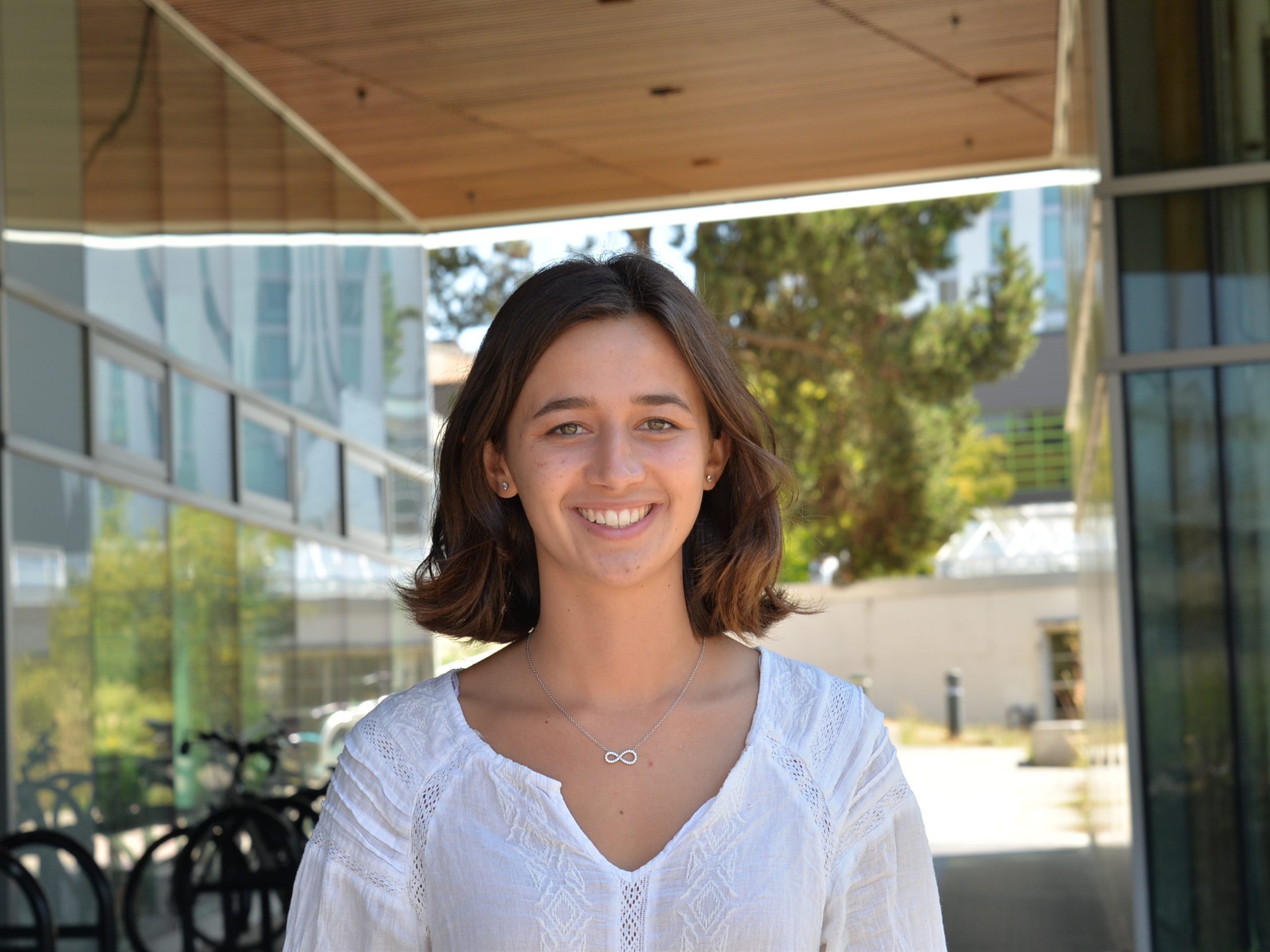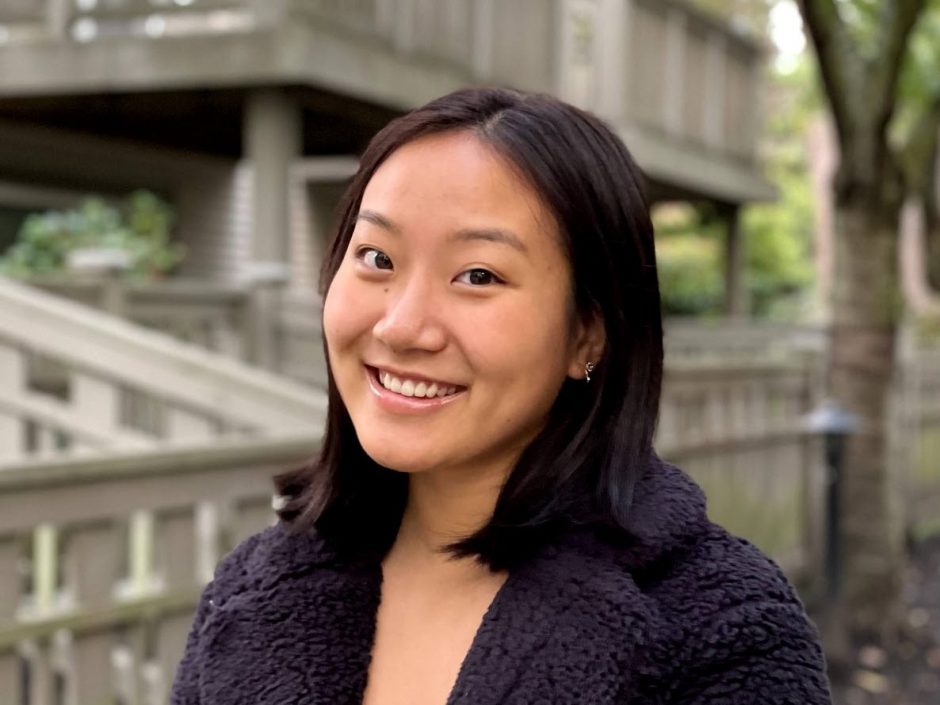

Thursday, August 25, 2022
Interview by Fumika Noguchi, Engagement Project Assistant, UBC Climate Emergency Response team
The Climate Action Mobilizers (CAM) are a group of highly motivated students that engage with communities across Vancouver to tackle social and climate justice issues around the climate emergency. UBC Centre for Community and Engaged Learning (CCEL) received the Climate Emergency Fund (CEF) to support this 2-year initiative that empowers CAM students to activate climate action.
Join us in this Q and A with two CAMs, undergraduate students Minaho Chiew and Isabella Montecalvo, as we hear from them about the challenges that students may face in climate work, what motivates them to take climate action, and how being a CAM is more than just a job.
What has brought you into the climate space? What is your climate story?
MINAHO: One of the biggest things that brought me into the climate space is learning about environmental racism and the disproportionate ways it affects people due to historic and on-going systems of oppression. What has kept me in this space is the continuous learning that I get to have about and with other people on the climate movement, whether it be on climate justice, Indigenous communities, corporations, or community-centered action.
ISABELLA: What brought me into the climate space is a lifetime of hearing about it. I learned about topics like the greenhouse gas effect early on. I care about a lot of different issues and especially intersecting issues, but I truly think we need to do something about the climate emergency before we can focus on anything else. This is a defining goal in my life, and it is an issue that I want to work on until we achieve or reverse climate change because I do not believe in a planet B. I cannot imagine throwing this world away, or else future generations will not be able to experience it like we have and that is horrifying to me.
What are some of the challenges that you have faced in climate work as a student?
ISABELLA: It is frustrating when you are in a pocket of UBC like CCEL doing climate work, but UBC as a broader institution is not fully aligning with what you are fighting for. Even though UBC prioritizes sustainability, it has still invested in fossil fuel companies, and important issues such as Indigenous rights or environmental racism are not yet prioritized. I think that it is truly frustrating for UBC students to be passionate about the climate emergency when the University is acting somewhat sneaky about its actions and responsibilities.
MINAHO: In addition to what Isabella said, people who are often in the climate space are those with structural privilege. I think that it is important to consider how race, gender, and class impact climate justice and why certain groups are not in these spaces, especially as I also think that climate work can sometimes be very ‘gate-keepy’. This is one of the ways that the CEF has allowed us to overcome these barriers by connecting directly with community members who may have many work and life commitments, but still care and want to act upon climate change.
What do you recommend students to consider when entering climate action and work?
ISABELLA: Although there can be a lot of gatekeeping in climate work, it is open to anyone who is interested or has a passion for learning. You bring something of value to the table even if you may not realize it. We are all affected by climate change, and just because you do not know something does not mean you should not try. I often feel imposter syndrome when I do not fully know a topic, but am constantly learning, and I think that is the most important thing. To sum it up, climate work is for everyone.
MINA: I often think the climate space lacks an analysis of how it affects the global majority, but more specifically, how it disproportionately affects people who are oppressed, and this is something that I want students to consider. Therefore, I think it is important for students to have critical analysis skills and I think that UBC is a great place to do that as there are many different courses that you can take to learn about these things. In addition, working in and with communities and listening to everyone’s lived experiences is also crucial for climate work.
ISABELLA: Expanding on what Mina said, I think students should understand that the climate emergency is very intersectional and involves a broader system. Students who are vaguely aware of climate action think that it is simply about being greener like using a reusable straw. However, that is not the case, because climate work is a whole interconnected system which includes systems of oppression and privilege.
What motivates you to keep moving forward and accelerating climate work with the UBC Community and beyond?
MINAHO: What motivates me is having the opportunity to be in a community that really cares about climate work. I have a friend who always reminds me that although it can feel debilitating to be working within an oppressive system, a better world is possible. Lastly, another thing that motivates me is working with youth and hearing about all their awesome ideas, and overall positivity and passion for creating a better future.
ISABELLA: The community at UBC also motivates me. Everyone we work with at CCEL is so attuned to climate change issues and it is nice to not have to explain this climate emergency to someone. On top of that, there are many spaces at UBC where you can interact with climate action and be inspired by, like Climate Hub, which is one group whose work I am especially inspired by. Ultimately, I want a better world, and I am going to keep striving for it for myself and for other people.
WHAT NEW SKILLS AND RESOURCES HAVE YOU GAINED DURING YOUR TIME AS A CAM THAT YOU WOULD NOT HAVE HAD THE CHANCE TO IN A CLASSROOM?
ISABELLA: My favorite thing about being a CAM is getting to engage with communities in Vancouver directly. I get to talk, meet, and listen to people in different neighbourhoods that I otherwise would not be able to do in courses, which helps me to expand the UBC bubble I sometimes feel trapped in. I have also learned how to plan events and execute them at a high, professional level, and I have gotten to expand my networks through connecting with various neighbourhood houses.
MINAHO: I think one of the biggest things that we have all gained is friendship. No matter how hard a professor can try to foster relationships in a classroom, it is difficult to do that because of the limited lecture times. All of us CAMs are more than just coworkers, we are friends. Relationship building is a key piece in advocacy work and movement building, because how can you bring forward meaningful work if you are not building connections with others? I have gotten to learn so much and make new connections as a CAM and it has truly been a privilege.
